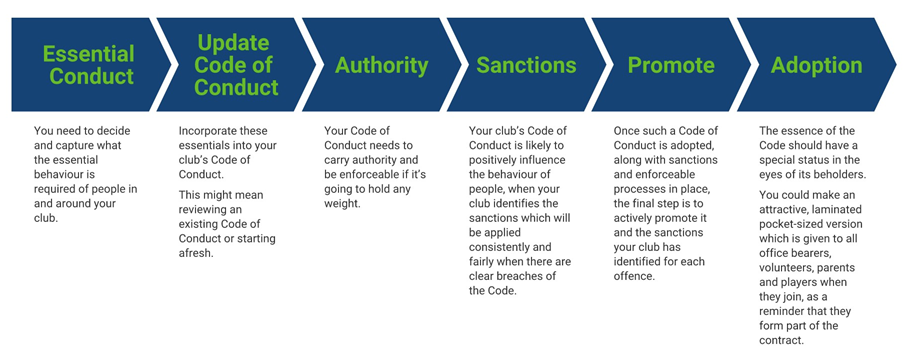-
Powerful Code of Conduct
Everyone connected to a club influences the culture of that club – for good or for bad. There are often Codes of Conduct that apply generally to a sport. These are usually detailed, well-developed statements which emphasise good behaviour, accountabilities and an expectation of playing and operating in the spirit of fair play and sportsmanship.
But these aren’t necessarily front and centre of club operations. They might be sitting in a folder somewhere, often not communicated effectively to new players, supporters and parents. Even if a Code of Conduct is upfront and visible in a club, there can be a sense around the club that they are just nice words, really.
It may look as though there are no sanctions in place. In situations like this, the question of a sport’s Code of Conduct only takes on relevance and importance when things go pear-shaped and a crisis hits the club.
The reality is that belonging to a club is actually a matter of contract. If you pay fees and are a member, the Code of Conduct is one of the terms of the contract. So, it is not so much about signing on to a Code of Conduct, but rather knowing that it exists and accepting that you are accountable, under this Code, for your actions in and around the club.
A powerful Code of Conduct is a critical ingredient in a club’s drive to become a place of respect, fun, fairness, safety and success. If your club wants to drive a strong respect agenda, with clear expectations of positive behaviours across the club, it has to demonstrate that it means business.
Sanctions need to be identified by your club and, where appropriate, applied fairly and consistently. As a general rule, people want to see integrity in operation. They feel let down and disappointed if they see gaps between stated behaviours and realities. Proper and fair enactment of its own Code of Conduct results in loyalty, regard and true confidence in and around the club.
Essential conduct of any Code of Conduct:
-
-
- it is full of respect for all people
- guarantees people’s safety at all times
- promotes non-violence
- achieves equal access and opportunities
- promotes fun and enjoyment
- meets our club’s success criteria
- accepts responsibility for individuals’ actions
- role models positive behaviour at every turn
-
-
-
Create a Powerful Code of Conduct

Step 1 – Capture essential conduct
You need to decide and capture what the essential behaviour is required of people in and around your club.
Step 2 – Update Code of Conduct
Incorporate these essentials into your club’s Code of Conduct. This might mean reviewing an existing Code of Conduct or starting afresh.
There are good examples of how clubs have already covered this base – here’s one we think fits the bill. Otherwise, start by checking with your state sport association.
Step 3 – Authority
Your Code of Conduct needs to carry authority and be enforceable if it’s going to hold any weight. Formally adopt it as part of the club’s overall policies and governance.
Step 4 – Sanctions
Your club’s Code of Conduct is likely to positively influence the behaviour of people when your club identifies the sanctions which will be applied consistently and fairly when there are clear breaches of the Code.
Seek guidance from third parties such as your state sport association, inputting sanctions and disciplinary processes in place.
Step 5 – Promote
Once such a Code of Conduct is adopted, along with sanctions and enforceable processes in place, the final step is to actively promote it and the sanctions your club has identified for each offence (alcohol abuse, on-field violence, parent abusive behaviour, club officials bullying or sexual harassment).
Visiting supporters will need to be dealt with differently because they are not subject to the contract with the club. You need to consistently message the power of your code of conduct that your club means business.
Be sure the code of conduct, including the sanctions and disciplinary processes, are visible around the club. It carries the power of a ‘third party’ and makes it easier and less confrontational to be able to point out when particular behaviour, attitude or language doesn’t sit within the club’s Code.
Step 6 – Adoption
The essence or core of the Code should have a special status in the eyes of its beholders. You could make an attractive, laminated pocket-sized version which is given to all office bearers, volunteers, parents and players when they join, as a reminder that they form part of the contract.
Make it obvious to your supporter base too. Although some may not be formal members or have signed up to the Code, make it known that there’s an explicit expectation that they respect and model the standards of behaviour that have been set by those who have.
